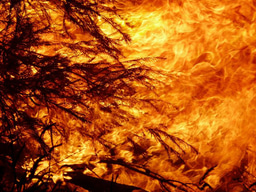Australian Fires
Published in Sustainability

Although climate change and related issues appear frequently in the news, it is often impossible for us to cover these current events in Nature Climate Change. Our production schedules mean that at minimum we have to wait about a month for a piece to go from the editor's hands to publication on the journal webpage, so what was once "timely" if often not by the time of publication. And because we seek to present original opinions and perspectives, we simply can't compete with coverage in news media outlets that publish on a much faster timescale.
Unfortunately, due to the length and severity of the 2019-2020 fire season in Australia, the collection of Comments and Correspondence on the Australian wildfires published in our March issue and summarized below remain as relevant today as when we first started working on them in January.
Our Editorial reflects on why the 2019-2020 Australian bushfires have so effectively shifted the dialogue around climate change in industrialized countries.
Eastern Australian mega fires burn globally unprecedented fraction of forest biome: Matthias Boer, Victor Resco De Dios, and Ross Bradstock use remote sensing data to establish the extraordinary nature of the 2019-2020 forest fires.
The role of climate variability in Australian drought: Andrew King, Andy Pitman, Benjamin Henley, Anna Ukkola and Josephine Brown suggest that the dry conditions in Australia that exacerbated the bushfires are the result of the absence of a La Niña or negative Indian Ocean Dipole event.
Knitting while Australia burns: Henriette Jager and Charles Coutant point to the scale mismatch between public mobilization to save individual animals and the climate adaptations needed to ensure the survival of species.
Transformative change requires resisting a new normal: Lesley Head warns that although the public response to the Australia fires offers a moment of political potential to act on climate change, doing so requires overcoming the processes that allow catastrophic conditions to become the new normal.
A fiery wake-up call for climate science: Benjamin Sanderson and Rosie Fisher call for climate scientists to account for the severity of the Australian wildfires in Earth System models to ensure that fire risk is not underestimated going forward.
Research is not immune to climate change: Lauren Rickards and James Watson highlight climate change impacts on the research sector, from the effects of the Australian fires and beyond, and urge rapid adaptation.
Follow the Topic
-
Nature Climate Change

A monthly journal dedicated to publishing the most significant and cutting-edge research on the nature, underlying causes or impacts of global climate change and its implications for the economy, policy and the world at large.
What are SDG Topics?
An introduction to Sustainable Development Goals (SDGs) Topics and their role in highlighting sustainable development research.
Continue reading announcement




Please sign in or register for FREE
If you are a registered user on Research Communities by Springer Nature, please sign in